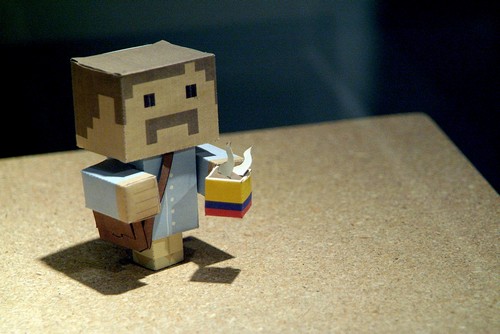 Photo by:
Photo by:
College students being enthralled with video games is old news, circa 1998. However, Rafael Fajardo, associate professor of Electronic Media and Design/Digital Media Studies, has hooked students on a wave of humane video games that make them pause the Grand Theft Auto and think about society in both a serious and humorous way.
By Fajardo’s humble, fun and soft-spoken nature, you might not realize he has put DU on the map as an epicenter for “humane” games.
Between teaching cyber-punk graduate courses and doing research, he has also managed to revolutionize the EMAD/DMS major at DU, and has helped launch the game development major through the Department of Computer Science.
Fajardo was born in Neiva, Colombia and immigrated to the U.S. with his parents at age three. A series of events at a young age brought Fajardo to the realization that his Colombian heritage was misunderstood in his hometown of San Antonio, Texas.
“When I would say I was from Colombia, kids would immediately ask if I could get my hands on any weed,” said Fajardo. “When I would say my grandfather owned a farm, they would ask what he grew and then they would snicker. It seemed to be a symptom of an ignorance we either have or cultivate about other parts of the world here in the U.S.”
Fajardo, who has a unique combination of artistic drive and technical curiosity, found a way to combine these two passions in college and graduate school through game development and design. He had an intellectual and artistic curiosity about the capability of video games to do something more.
“A socially-conscious video game intentionally attempts to raise awareness about social issues and critique social structures through game play,” said Fajardo. “I began exploring the game medium because I wanted to see if it was possible to create a wider variety of video games through an exploration of their expressive potential.”
His video games focus on the Narco culture, through which he compares and contrasts attitudes toward licit and illicit stimulant agriculture.
“We have sanctioned stimulants, such as coffee and caffeine. Many other cultures have traditional uses for poppies and coca,” said Fajardo. “How do we as a society define the border between those and their chemically refined counterparts, such as cocaine and heroin, and what are the consequences of those definitions for the people who grow these plants?”
Fajardo’s life in El Paso, Texas, was the inspiration for his earlier works on the Narco culture at the U.S.-Mexico border.
Now they seem to be coming together with his later work on Colombia, which he began in 2004 with the help of undergraduates in his department.
“My mother had come back from Colombia 10 to 15 years ago and told me at the edge of the coffee plantations by the fences, where it was too narrow for another row of coffee plants, there were poppies planted. No one knew it was going to be a ‘thing’ in the drug market of South America,” said Fajardo. “Now the majority of heroin in the U.S. is made in Colombia.”
The Colombia-based video games are colorful, boxy and bright.
Games include a foosball-like soccer game and an activity where the player races the clock to clear poppy plants to plant coffee. These games use the upside-down logic Fajardo associates with Colombia, in which it seems impossible to win.
The contrast of the bright and playful game with the dark humor seems to reflect Fajardo’s general preference for satire.
“Using satire through my work allows me to cope and to understand the violence and unfairness that exists or existed in Colombia during my lifetime and before. Some would say that the black humor I employ is a literary tradition of Latin American authors. It was not intentional, but working in that tradition felt very natural to me,” said Fajardo.
The hero of the game, Juan Valdez, was a fictional character in a commercial used to sell Colombian-grown coffee in the 1960s.
Fajardo adopted Juan and created his backstory because he felt this commercial image was the starting point at which many people began to understand Colombian culture.
Although Juan Valdez is an unlikely hero, especially when pitted against drug lord Pablo Escobar, he illustrates the nature of heroism in Colombian life.
“To me, to be a hero is to be willing to act in spite of uncertainty and in spite of fear. To be willing to lend your strength to those who are weaker or vulnerable – makes you a hero,” said Fajardo.
Fajardo has recently transformed his video game characters into paper dolls, which he refers to as “critical toys,” or in some cases, “(in)action figures.”
The dolls, which are currently on display in the Myrhen Gallery, include QR code available to anyone with a smart phone to scan, and include Juan Valdez, a Narco submarine, a poppy plant and even the Arch Bishop of Bogota.
In constructing the dolls, Fajardo had to consider a variety of elements, from tabs and glue to the way the pieces were arranged on the page.
He uses special software and an iPad to complete most of his design work, which currently includes a coffee plant and a rubber tree.
His designs are inspired by street artists, graphic designers and old-school paper dolls.
Fajardo plans to keep breaking ground in the world of socially conscious games through creative research, student projects and board memberships with organizations such as gamesforchange.org.











